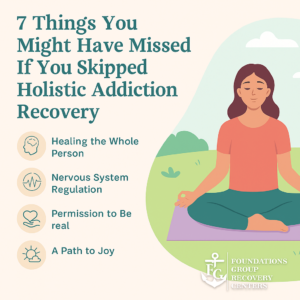Relapsing after 90 days can feel like falling off a cliff you worked so hard to climb. You had momentum. You had hope. And then suddenly, it slipped. But here’s what we want you to hear clearly: you didn’t fail—something vital may have been missing from the kind of treatment you received.
Holistic addiction treatment isn’t fluff. It’s not an “extra” or a “nice to have.” For many people, it’s the layer of care that finally helps the whole self—mind, body, and nervous system—feel safe enough to recover. And at Foundations Group Recovery Centers in Massachusetts, it’s fully integrated with proven, evidence-based therapies.
If you skipped holistic care the first time, here are seven things you may not have even known you needed.
1. A Way to Heal More Than Just the Substance Use
Behavioral therapies like CBT or relapse prevention are powerful—but they usually focus on surface behaviors and cognitive patterns. Holistic care asks a different question: What does your body remember?
Unresolved trauma, chronic stress, and emotional suppression don’t always respond to talk therapy alone. Practices like somatic therapy, trauma-informed yoga, and guided meditation give the body a chance to process and release what it’s been holding onto for years. Especially for alumni who’ve relapsed, addressing the root instead of just the habit can shift everything.
2. Support for the Nervous System You’re Actually Living In
You might’ve left your last program with all the right tools—coping strategies, a sponsor, a plan. But the minute life got chaotic again, your body reacted before your mind could catch up.
Holistic addiction treatment centers around nervous system regulation. Tools like breathwork, sound healing, acupuncture, and grounding techniques train your body to move from a reactive state (fight-flight-freeze) into one that can pause, breathe, and choose differently. This is what many alumni realize they didn’t have before: a body that feels safe enough to stay sober.
3. Spiritual Grounding Without Pressure
You don’t have to be religious to need meaning. After a relapse, it’s common to feel unmoored—like your compass got broken along the way. Holistic care creates gentle space to explore spirituality in a way that’s personal and nonjudgmental.
This might look like mindful time in nature, journaling through existential questions, or expressive arts that help you access something beyond words. It’s not about finding “the right” belief system—it’s about rebuilding a sense of inner belonging, which can be crucial for long-term recovery.
4. Integration with Evidence-Based Therapies (Not a Replacement)
Holistic care isn’t a detour—it’s a bridge. At Foundations Group Recovery Centers, holistic modalities are woven directly into evidence-based care. That means you’re still receiving proven therapies like DBT, trauma counseling, and psychiatric support—just with deeper emotional and physical support alongside them.
This integrative approach often enhances clinical effectiveness. For example, a client might do breathwork before an EMDR session to reduce anxiety and increase emotional accessibility. Or they might process a difficult group therapy session through art or music later that day. It’s about letting every part of you participate in recovery—not just your intellect.
5. An Outlet for Emotions That Feel Bigger Than Words
There are moments in recovery when you can’t talk your way through what you’re feeling. Shame after a relapse. Rage that doesn’t make sense. Grief for the person you used to be. Holistic modalities help you move those emotions through instead of just around.
Whether through movement, painting, music, or nature immersion, these experiences offer pressure release without judgment. Many alumni describe it as “exhaling for the first time in months.”
6. Permission to Show Up Without Pretending You’re Fine
If your last treatment experience left you feeling like you had to “perform recovery”—always be grateful, always show progress—you’re not alone.
One of the underestimated benefits of holistic addiction treatment is that it makes room for the messy, silent, shameful parts of healing. You don’t have to explain why you’re not okay. You just get to be in your body and feel what’s true, without needing to package it for someone else.
7. A Recovery Path That Includes Joy, Not Just Abstinence
This might be the biggest thing that gets missed: recovery isn’t just about not using. It’s about learning how to feel good in your own skin again. Holistic treatment focuses on the kind of joy that doesn’t spike and crash. It’s about slow mornings, food that tastes like something, walks that reconnect you with the world, and sleep that actually restores you.
You don’t have to earn joy. You just have to allow space for it. That’s what holistic care helps rebuild—bit by bit, from the inside out.
Frequently Asked Questions About Holistic Addiction Treatment
What exactly is holistic addiction treatment?
Holistic addiction treatment refers to recovery support that addresses the whole person—mind, body, and spirit. It includes therapies like yoga, meditation, acupuncture, breathwork, nutrition counseling, and creative expression. At Foundations, these services complement clinical approaches like CBT, DBT, and trauma therapy.
Is holistic treatment backed by science?
Yes. While not all holistic therapies have the same level of clinical research, many are evidence-informed and widely used in accredited treatment centers. More importantly, they’re integrated with evidence-based therapies—not used instead of them.
Do I have to be spiritual to benefit from holistic care?
Not at all. Holistic care creates room for meaning and connection, but that might look different for everyone. Some people find comfort in nature, others in creativity or movement. It’s about feeling grounded in a way that resonates with you.
Will holistic treatment help me avoid relapse?
There are no guarantees in recovery, but holistic care often fills in the gaps that lead people back to substance use—chronic stress, unresolved trauma, disconnection, or nervous system dysregulation. It’s not a magic fix, but it can be a powerful foundation for stability.
Can I access holistic treatment if I’m not local to Mashpee?
If you’re not based in Mashpee, there may still be options. Foundations Group Recovery Centers serves individuals from surrounding areas like Barnstable County and Falmouth. Reach out to explore what’s possible based on where you are.
A Gentle Step Forward
You don’t need to start over—you just need a different way forward. If your last experience with treatment left something out, holistic care might be what brings it all together.
📞 Call (844)763-4966 or visit our Holistic Addiction Treatment page to explore how we can support your whole self in recovery—mind, body, and spirit.


